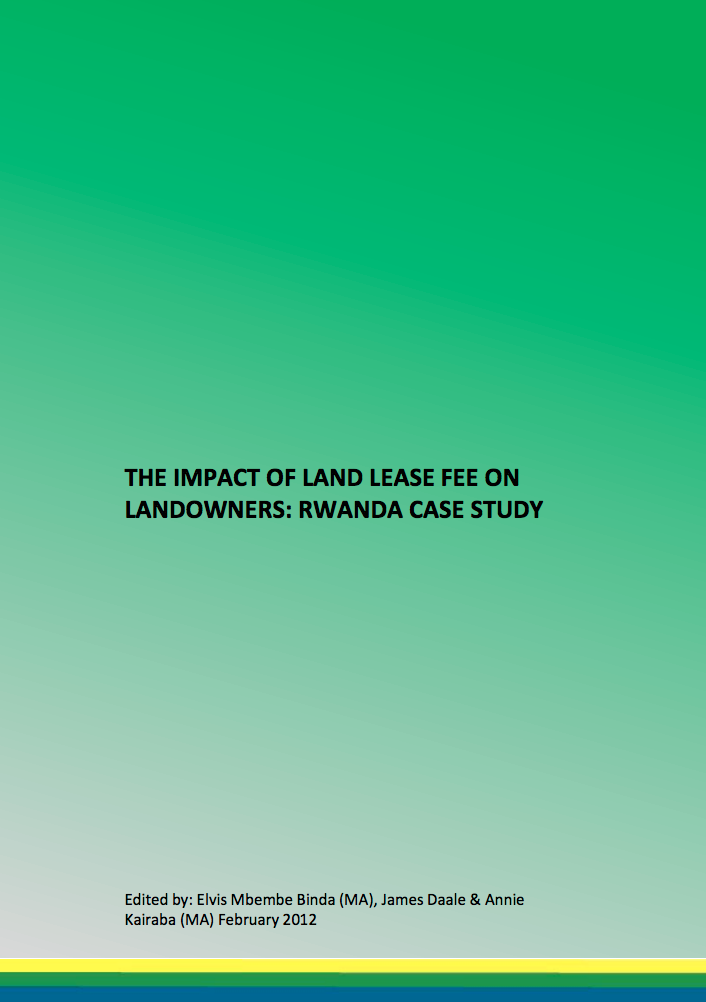The LAND Project is a five year program supported by the United States Agency for International Development (USAID). Its primary goal is strengthening the resilience of Rwandan citizens, communities and institutions and their ability to adapt to land-related economic, environmental and social changes.
Resilience is defined as “the ability to withstand or recover from difficult conditions.” It also comprises the ability of human and ecological systems to recover from shocks or difficult changes, and to transform to a better condition by responding flexibly and creatively to stress factors. In Rwanda, land tends to be one of the primary assets citizens rely on to buffer against difficult conditions and rapid change.
The project’s central objectives are twofold:
1.Increased capacity of local Rwandan institutions to generate high quality, evidence-based research on land-related issues that can be used by the Government, civil society organizations, and Rwandan citizens.
2. Increased understanding of land laws, policies, regulations, and legal judgments on land-related issues by GOR officials, local civil society organizations, research institutes and citizens.
Key outcomes of the project include:
- Holding annual National Land Research Agenda workshops to establish the research priorities of land sector stakeholders that the LAND Project will support. These workshops bring together multiple stakeholders from government, civil society and the research community;
- Supporting research on land-related issues through competitive awards to Rwandan research institutions, universities, and civil society organizations, and providing tailored capacity building assistance to improve research and advocacy capabilities;
- Offering training and other support to legal assistance providers to enhance their capacity to support women and vulnerable populations in understanding and realizing their land rights;
- Training local land authorities on the implementation of the land law and regulations.
- Carrying out research on critical land issues, including gendered land rights in practice, community rights to resources in and around protected areas, and expropriation.
- Managing a land-focused website to improve research, communications, and policy advocacy efforts that are focused on land, and to act as a vehicle for enhancing collaboration between actors working in the land sector;
- Providing organizational development support to civil society organizations supporting women’s land rights.
- Supporting innovative and coordinated communications approaches by civil society and government that enhance the knowledge of Rwandan citizens about research findings and their land rights.
Because the LAND Project is a five year endeavor, we are seeking an institution that has the interest, capacity, skills and resources to eventually take over hosting and maintenance of the website, ensuring it stays up-to-date and relevant to the land sector stakeholder community. If your organization is potentially interested in assuming management of this site, please contact us and tell us why you believe your institution would be an ideal candidate.
Members:
Resources
Displaying 46 - 50 of 149Multitemporal LANDSAT Imagery Analysis to Study the Dynamics of Land Cover over Lake Kivu Region
In this study, maximum likelihood supervised classification and post-classification change detection techniques were applied to cloud-free Landsat mosaic scenes formed for three years, 1987, 2001 and 2010, to map land cover changes in the Lake Kivu region in Central Africa. A supervised classification was carried out on the stacked vector of six reflective bands and two vegetation index images for the three years individually with the aid of ground data. Since ground data was not available for 1987, visual interpretation was used to aid supervised classification.
Linking Vulnerability, Land and Livelihoods: Literature Review
This chapter accomplishes several purposes, in which it shares the reader the theoretical orientation and empirical evidences of numerous studies that are closely related to the issues being raised in this study. It deals with the review of theoretical and empirical literature mainly related to rural poverty and livelihoods. In doing so, the chapter intentionally includes discussions on a wider scale to look at pertinent literature from many sub-Saharan African countries and beyond that have some resonance to better understand and relate the Ethiopian case to the wider literature.
The Impact of Land Lease Fee on Landowners: Rwanda Case Study
The majority of rural Rwandans are dependent on land for their livelihoods. Recognizing the critical nature of land to peace, stability, and economic development, Rwanda began implementing the Land Tenure Regularisation Process (LTRP) in 2008. While the Rwanda government has made highly commendable efforts in implementing the LTRP, some challenges have been faced, including a challenge whereby landowners only came to learn about the requirement of paying land lease at the time of collecting the Ownership Documents.
Understanding Informal Urban Land Market Functioning in Peri-urban Areas of Secondary Towns of Rwanda: Case Study of Tumba Sector, Butare Town
Since mid-1970s, a great number of rural-urban migrants are converging towards Kigali, the capital of Rwanda, and secondary towns, putting strain on land, especially of urban fringes. This is the case of Tumba Sector, a suburb of Butare Town, which attracts many people searching land for various uses. The purpose of this paper is to analyse the land market process in Tumba Sector. Data used in this paper were collected through desk study, survey and from non-structured interview held with the Tumba Land Bureau Officer.
Enhancing Legal Empowerment and Customary Law in Rwanda: Report of a Pilot Project concerning Community-level Dispute Resolution and Women’s Land Rights
We present a report on the results of a 10-month pilot project conducted in North- Western Rwanda that aimed to explore fruitful ways to engage with customary law in order to empower rural communities and rural women in particular. The focus is on the effectiveness of land dispute resolution at the community level and the respect for women’s formally guaranteed land rights by the institutions involved.




